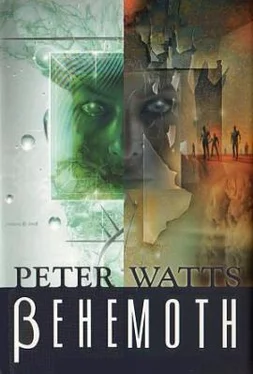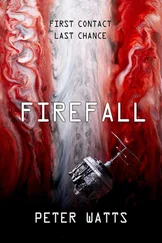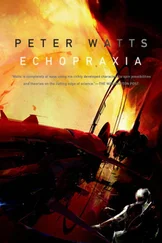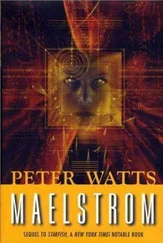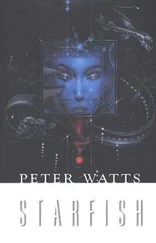For long merciful hours, there is no virulent microbe to track; no betrayal to withstand; no desperate battle to fight. There is nothing to do but dwell on the microcosm receding behind them, on friends and foes brought finally into war-weary alignment—not through negotiation or reconciliation, but through the sudden imminence of the greater threat, the threat from outside . The threat Phocoena races towards even now.
Perhaps not such a blessing after all, this interlude.
Eventually the seabed rises before them into a color-banded escarpment swelling across the screen. There's a gap in the wall ahead, a great underwater canyon splitting the Scotian conshelf like God's own icepick. Nav lists it as The Gulley . Clarke remembers that name; it's got one of the biggest shortstop arrays this side of Fundy. Lubin indulges her, edges a few degrees off-course to intersect one of the colossal structures halfway up the canyon's throat. He flashes the forward floods as they drift past. The seamill looms huge in the beams, the visible arc of its perimeter so slight that Clarke could have taken it for a straight line. One of its great blades passes above them, its base and its tip lost in darkness to either side. It barely moves.
There was a time when this was the competition. Not so long ago the currents of the Gulley produced almost as many Joules-per-second as a good-sized geothermal plant. Then the climate changed, and the currents with it. Now the array is nothing but a tourist stop for amphibious cyborgs: weightless derelicts, slumbering in the long dark.
That's us, Clarke reflects as they pass. For just this one moment she and Lubin are weightless too, poised precisely between two gravitational fields. Behind them: Atlantis, the failed refuge. Ahead—
Ahead, the world they've been hiding from.
Five years since she's been ashore. Back then the apocalypse was just getting under way; who knows how wild the party's grown by now? They've learned a few things—broad strokes, dark rumors, bits and pieces filtered from that fraying patch of the telecom spectrum that spans the Atlantic. All of North America is quarantined. The rest of the world bickers over whether to put it out of its misery or simply let it die on its own. Most still fight to keep ßehemoth at bay; others have embraced that doomsday microbe, have seemingly embraced Armageddon itself.
Clarke isn't quite sure what to make of that. Some death-wish buried in the collective unconscious, perhaps. Or maybe just the grim satisfaction that even the doomed and downtrodden can take in payback. Death is not always defeat; sometimes, it is the chance to die with your teeth buried in your oppressor's throat.
There is much dying, back on the surface. There is much baring of teeth. Lenie Clarke does not know their reasons. She knows only that some of them act in her name. She knows only that their numbers are growing.
She dozes. When she opens her eyes again the cockpit glows with diffuse emerald light. Phocoena has four bow ports, two dorsal two ventral, great perspex teardrops radiating back from the nose. A dim green void presses down on the upper ports; below, a corrugated expanse of sand rushes past beneath Clarke's footrest.
Lubin has disabled the color-codes. On nav, Phocoena races up a gentle monochrome slope. The depth gauge reads 70m and rising.
"How long have I been sleeping?" Clarke asks.
"Not long." Fresh red scars radiate from the corners of Lubin's eyes, the visible aftermath of an operation that slid neuroelectric inlays into his optic nerves. Clarke still winces inwardly at the sight; she's not sure she would've trusted the corpses's surgeons even if they are all on the same side now. Lubin obviously thinks the additional data-gathering capacity was worth the risk. Or maybe it's just one of those extras he's always wanted, but never been cleared for in his past life.
"We're at Sable already?" Clarke says.
"Almost."
Bleating from nav: hard echo up the slope at two o'clock. Lubin throttles back and slews to starboard. Centrifugal force swings Clarke to the side.
Thirty meters. The sea outside looks bright and cold. It's like staring into green glass. Phocoena crawls up the slope at a few sluggish knots, sniffing northwest towards a wireframe assembly of tubes and struts swelling on nav. Clarke leans forward, peers through shafts of murky light. Nothing.
"What's the viz out there?" she wonders.
Lubin, intent on his piloting, doesn't look over. "Eight point seven."
Twenty meters from the surface. The water ahead darkens suddenly, as though an eclipse were in progress. An instant later that darkness resolves into the toe of a giant: the rounded end of a cylindrical structure half-buried in drifting sand, fuzzed with sponges and seaweed, curving away into the hazy distance. Nav pegs it at eight meters high.
"I thought it floated," Clarke says.
Lubin pulls back on the stick: Phocoena climbs into the water alongside the structure. "They beached it when the well ran dry."
So this great sunken pontoon must be flooded. Girders and struts stand on its upper surface, a monstrous scaffold rising into daylight. Lubin maneuvers the sub between them as though threading a needle. Nav shows them entering a submerged arena enclosed by four such structures arranged in a square. Clarke can see their dim outlines through the water. Pylons and trusses rise on all sides like the bars of a cage.
Phocoena breaks the surface. The outside world ripples as water sheets down the acrylic, then wavers into focus. They've come up directly beneath the rig; its underbelly forms a metal sky a little less than ten meters overhead, held from the earth by a network of support pylons.
Lubin climbs from his seat and grabs a fanny pack off a nearby utility hook. "Back in a few minutes," he says, popping the dorsal hatch. He climbs away. Clarke hears a splash through the opening.
He still isn't happy about her presence here. She ignores his safe-distancing maneuver and rises to follow.
The air wafting through the hatch blows cold against her face. She climbs onto the sub's back and looks around. The sky—what she can see of it, through the girders and pylons—is gray and overcast; the ocean beneath is gunmetal to the horizon. But there are sounds, behind her. A distant, pulsing roar. A faint squawking, like some kind of alarm. It's familiar, but she can't quite put her finger on it. She turns.
Land.
A strip of sandy shore, maybe fifty meters past the jacket of the rig. She can see tufts of weathered, scrubby brush above the high-tide line. She can see moraines of driftwood, pushed into little strips along the beach. She can see surf pounding endlessly against it all.
She can hear birds, calling. She'd almost forgotten.
Not N'Am, of course. The mainland's still a good two or three hundred kilometers away. This is just a way station, some lonely little archipelago on the Scotian Shelf. And yet, to see living things without either fins or fists—she marvels at the prospect, even as she marvels at her own overreaction.
A steep metal staircase winds around the nearest pylon. Clarke dives into the ocean, not bothering with hood or gloves. The Atlantic slaps her face, a delicious icy sting across her exposed skin. She revels in the sensation, crosses to the pylon with a few strokes.
The stairs lead onto a walkway that runs the perimeter of the rig. Wind strums the railing's cables; the structure clatters like some arrhythmic percussion instrument. She reaches an open hatchway, peers into the dark interior: a segmented metal corridor, bundles of pipe and fiberop running along the ceiling like plexii of nerves and arteries. A t-junction at the far end leading off to unknown, opposite destinations.
Читать дальше
